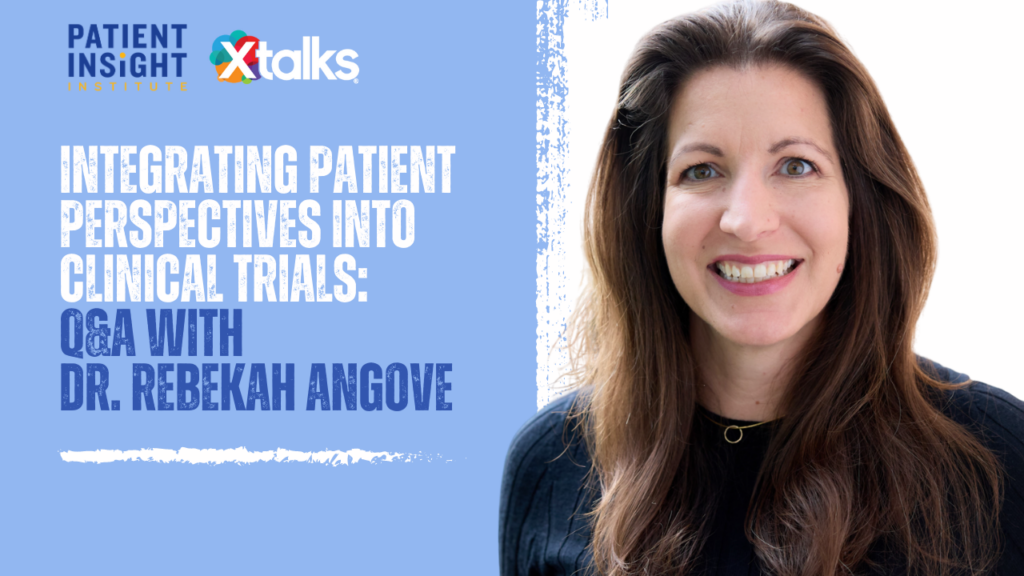Today’s healthcare landscape is rapidly shifting, with an emphasis on the need for patient-centered care. Xtalks’ recent discussion with Rebekah Angove, PhD, Executive VP of Research and Evaluation at the Patient Advocate Foundation (PAF), offers a deeper understanding of incorporating patient narratives into clinical trials.
Established over 25 years ago, the PAF has been dedicated to providing direct services to patients experiencing access and affordability challenges, especially those with chronic or complex conditions.
With experience in assisting over 150,000 patients annually across a spectrum of more than 600 conditions, the PAF has gathered invaluable insights into patient experiences. Five years ago, under Dr. Angove’s leadership, the foundation took on the mission to embed patient perspectives into healthcare policies and research, ensuring that the healthcare system is responsive to their unique needs.
Prioritizing Patient Participation in Clinical Trials
Incorporating patients in the planning, strategy and recruitment stages of a study is essential to ensure that clinical research genuinely reflects patient needs. Recognizing this, PAF’s Patient Insight Institute dedicates its efforts to integrating patient viewpoints into clinical trial designs.
However, significant hurdles persist. A telling statistic from PAF’s surveys reveals that nearly 70 percent of patients have never been invited to participate in clinical trials. This gap is further widened by the prevalence of clinical trials in large healthcare settings, which are often out of reach for numerous patients, especially those in smaller community health environments or rural regions.
To bridge this gap, PAF not only educates patients about available clinical trials but also assists in navigating them.
“Patients frequently approach us, exploring clinical research as a potential care option. Through our case management system, we guide them towards suitable clinical trials,” says Dr. Angove.
When patients do decide to participate, it’s imperative to ensure that every step of their experience is tailored to their needs, from grasping their obligations to minimizing the challenges of engagement.
Enhancing Patient Involvement and Retention
Successful and relevant clinical trials hinge upon effectively involving patients from the conceptualization stage to the design stage and throughout the entire clinical study.
“The focus should not be solely on recruiting patients but also on retaining them,” says Dr. Angove. According to Dr. Angove, the key to encouraging participation lies in reaching out and cultivating trust with potential participants.
Early Engagement is Key
For patients to stay committed to a trial, they need to grasp its objectives, its significance to their condition and the expectations from them. Initiating engagement early is pivotal in this endeavor. Such proactive engagement ensures that trials:
- Zero in on the concerns paramount to patients.
- Are structured in a manner that is straightforward for patients.
- Are developed with patient-friendly recruitment efforts.
- Offer clear educational and consent materials.
By making the process patient-centered, the chances of patients feeling overwhelmed or burdened are reduced. The onus should never be on the patient after they enroll — it should be on the organizers to make the process as seamless as possible.
Addressing Patient Needs
Participation in trials can present patients with a myriad of hurdles, from logistical issues like transportation to social challenges that can deter their commitment to a trial. Being attuned to and proactively addressing these challenges is pivotal for retaining participants.
Regrettably, it’s not rare for patients to withdraw from trials, finding them either too demanding or misaligned with their daily routines and needs. Thus, adapting to patient requirements is crucial.
The Value of Patient Experience Data
“All clinical trials should have some sort of patient-centered outcomes associated with them,” says Dr. Angove. “It’s going to ensure that you develop a treatment that not only works for patients, but it’s something that patients are going to be able to adhere to and want to take.”
This poignant insight sheds light on a vital issue. While the effectiveness of a drug is paramount, its utility diminishes if patients can’t tolerate, afford or are unwilling to take it. Collecting and acting on patient experience data from the start ensures treatments align with their needs and desires.
Decentralized Clinical Trials and the Digital Divide
The future of clinical trials seems to be leaning towards decentralization. Beyond the obvious benefit of reduced travel, Dr. Angove suggests that there’s more to consider.
“A lot of times clinical trials are centralized because they need to control every aspect… and I think we can give patients the benefit of the doubt that they can adhere to certain protocols,” says Dr. Angove.
Patients and their caregivers are capable of following specific protocols, whether it’s using wearables or devices connected to the internet or monitoring their own blood pressure. Trusting patients to responsibly participate in decentralized, patient-focused trials can lead to optimal trial outcomes, as they are equally invested in their results.
In addition to empowering patients, it’s also vital to incorporate their usual care centers in the trials. By shifting some steps of the trial to where patients receive their regular care, trust is built and their burden is minimized.
However, there’s no denying that as we move into a more digital age, not everyone is benefiting equally. The “digital divide” — the gap between those with effective internet access and the ability to use digital devices and those without — poses a significant challenge to decentralized trials.
“The good news is when we survey our patients — which are a fairly representative sample of those patients that have some sort of access or affordability challenge — we find that for the most part, they have devices. Those devices tend to be mobile, so you need to make things mobile-friendly, which I feel like we’re doing more and more,” explains Dr. Angove.
Another significant consideration is the connectivity challenges in areas, especially in rural regions where internet bandwidth is often limited. Many places still struggle with restricted Wi-Fi and mobile data availability.
Addressing this infrastructure gap is essential. While many individuals have data plans, their willingness to allocate data for trials needs consideration. For locations demanding higher connectivity, solutions might include subsidizing or covering connectivity costs for patients, be it through home Wi-Fi or mobile data.
Recognizing these challenges is the first step. By making platforms mobile-friendly and considering how to bridge connectivity gaps, Dr. Angove says the healthcare industry can ensure that innovations like decentralized trials remain inclusive and reflective of patient needs.
As our conversation with Dr. Angove from the PAF has highlighted, patient advocacy is far more than a buzzword — it’s the cornerstone for creating meaningful advancements in healthcare.
By both strategically and organically integrating patient perspectives in clinical trials; addressing challenges like the digital divide; and decentralizing trials to suit patient needs, the medical community can chart a more inclusive and effective course forward.
The future of clinical research is not just about scientific advancements but also about ensuring these advancements resonate with and are accessible to the very people they aim to benefit: the patients.












Join or login to leave a comment
JOIN LOGIN